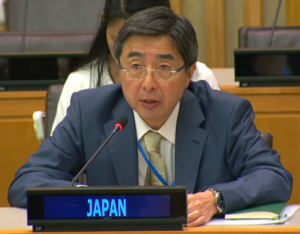Statement by H.E. Ambassador ISHIKANE Kimihiro, Permanent Representative of Japan to the United Nations, at the Peacebuilding Commission (PBC) Ambassadorial-level meeting on “Education’s role in building peace in Nepal and Sierra Leone”
2023/9/14

I would like to extend my sincere gratitude to the Minister of Nepal, H.E. Mr. Narayan Prakash Saud and Minister of Sierra Leone H.E. Mr. Chernor Bah for sharing valuable insights on peace-building practices and ensuring continued and quality education. I also thank Deputy Secretary-General Amina Mohamed, and Mr. Al Sulaiti for their informative briefings.
The endeavor to resolve conflicts after they have taken root is, in some sense, a belated effort. Once a country falls into conflict, the opportunity to provide education is endangered. Without education, it is impossible to build a peaceful and prosperous nation. A learning environment gives young people the chance to fully develop their human potential. This will allow them to help build resilient institutions that foster development, peace, and security in their countries.
Thus, it is imperative to invest in preventing conflicts and their recurrence. Today, I reaffirm my belief that education is a cross-cutting instrument to empower people at all levels to engage in humanitarian, development, and peacebuilding activities, and therefore a powerful tool to prevent conflict.
The experiences of Nepal and Sierra Leone clearly demonstrate that ensuring education continuity at both policy and implementation levels has positive impacts in both the short and long term. Education provides the opportunity for all individuals to acquire a deeper understanding of the multifaceted challenges that can cause violence and inequality. It also allows them to develop the skills and attitudes needed for conflict resolution and prevention, even in the most crisis-affected settings.
At the same time, we also need to ensure that education policies and practices do not convey negative stereotypes, biases or discrimination, which can exacerbate conflict and fragility. Education instead should be a means to ensure dignity, solidarity and human security for all. Here it is worth recalling that, during the Security Council Open Debate in January over which I presided, DSG Mohamed reiterated that investments in people and investments in human security are also investments in lasting peace.
Mr. Chair,
I commend this meeting for utilizing the unique convening power of the PBC and providing us with a learning opportunity on how education plays a critical role in preventing conflict and contributing to sustainable peace. I would like to raise two additional ways that the PBC can support the promotion of education. First, it can incorporate education-focused perspective when providing its advice to UN organs. Second, it can hold a PBC meeting on early-warning to discuss strategies for safeguarding education whenever the UN detects severe disruptions in a country’s education system. In such situation, the PBC can also assist the Security Council to revive horizon-scanning meeting to discuss possible causes of conflict, as necessary.
The UN plays a crucial role in fostering global solidarity by ensuring the continuity of quality education for all, even in times of crisis. As a member of the PBC and a global education champion country of the Transforming Education Summit, Japan will continue to support the PBC in such efforts.
